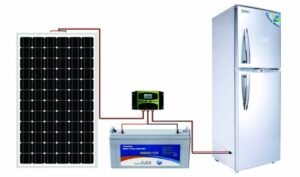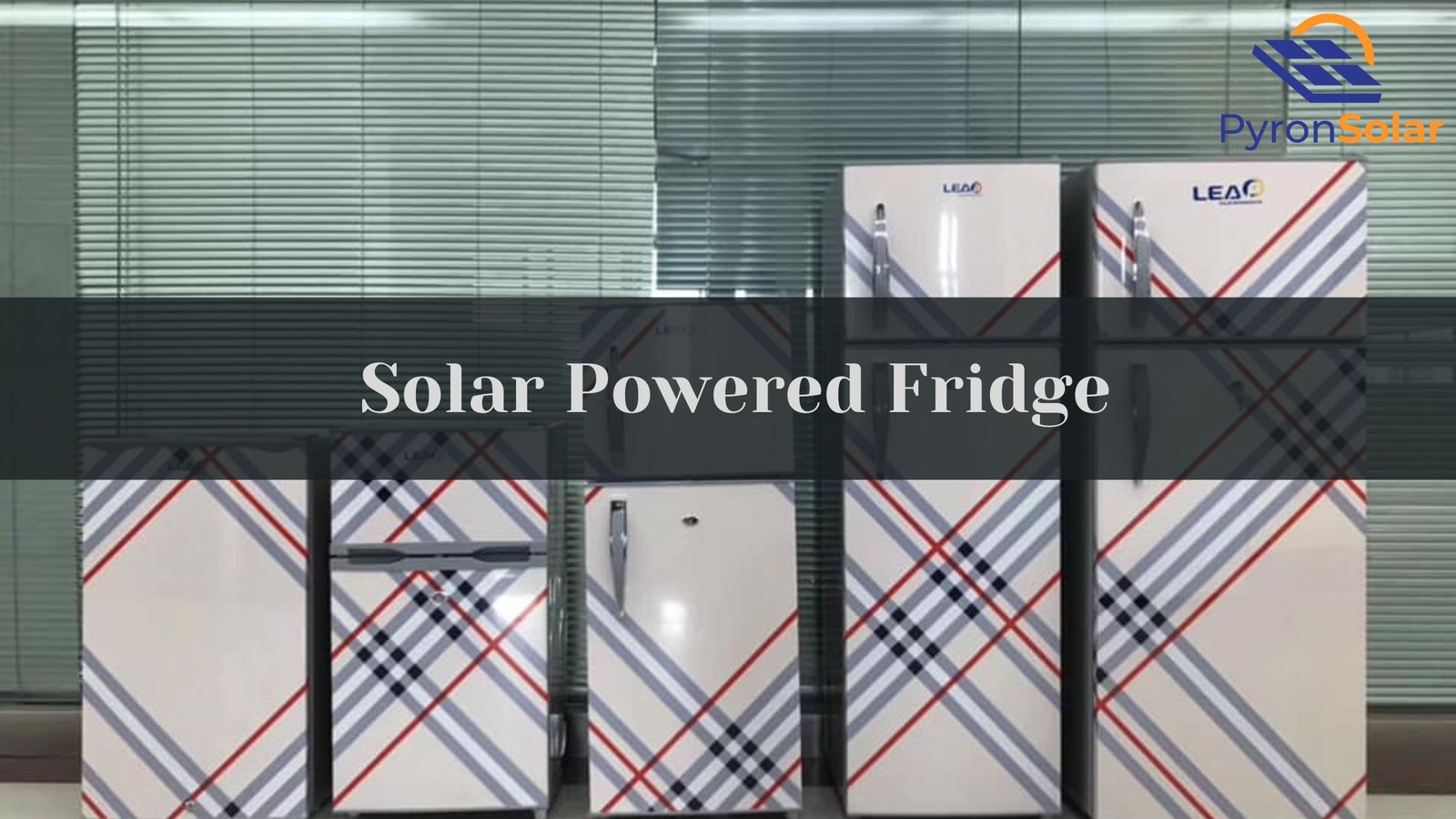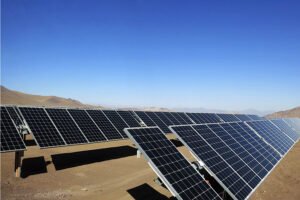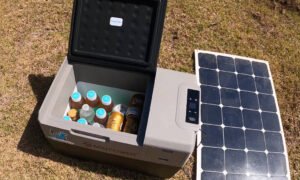Solar power is a beautiful resource that is gaining popularity every day. Sometimes I get curious about whether solar energy can power typical home appliances. Do you also wonder about it?
The answer is yes; we can use solar power to operate appliances in our household. You can easily use solar power for fridges. Since refrigerators use a significant amount of energy, choosing the right one is crucial if you switch to solar power. When purchasing a solar-powered refrigerator, there are a few things to consider. The most vital factor is size. Ensure the fridge you purchase is large enough to accommodate your demands but not excessively, as this will result in more energy use. Not only refrigerator, now a days you can also use your television using these panels.
Additionally, it would help if you considered the local temperature and the sunlight exposure your house gets. Another thing to consider is the specific type of solar panel you’ll use. There are two main types of solar panels: monocrystalline and polycrystalline.

Undoubtedly, the majority of householders can’t survive without a fridge. Typically, four standard solar panels are required to power a refrigerator. But how much solar power do I need to run a refrigerator?
Since refrigerators come in various shapes and sizes, they also require varying amounts of solar energy. It would help to consider how long you anticipate using your refrigerator when determining the amount of solar power necessary to run one.
In simple words, you would require 300 to 400 watts of solar power to operate a full-size refrigerator on solar energy. The amount of solar energy you need depends on how much electricity your refrigerator consumes and where you live.
Solar power for fridge- Required devices to run
We will need a few devices that work together with solar panels to run a refrigerator using solar energy. Batteries are required to store energy at night or in cloudy conditions.
A charge controller is required to ensure that the electricity flows steadily and without interruption from the panels to the batteries. This controller will also track the voltage and current. The setup will also require an inverter to convert the direct current (DC) to alternating current (AC).
Number Of Solar Panels Needed To Run A Refrigerator
As we know, using solar panels will lower your energy bills and help the environment. But how many solar panels do we need to power a refrigerator?
The refrigerator’s size and solar panel capacity will determine how many panels we need. We would need at least a 300-watt solar panel system to power a fridge, as refrigerators typically consume between 300 and 600 watts of electricity. If your refrigerator is large, you may require a system with an output of more than 600 watts to meet your power requirements.
Simply put, a solar panel that generates around 1500 to 2000 Wh of energy per day is required to power a standard-sized refrigerator using solar energy continuously. A solar array produces this much electricity of 3 to 6 100-watt solar panels. The more sunlight you get each day, the fewer solar panels you need.
You mainly need to be aware of two things to accurately estimate the number of solar panels required to power your refrigerator:
An estimation of your refrigerator’s daily energy consumption and the amount of sunlight your solar panels would receive each day.
If you are still eager to know how many solar panels are needed to run a refrigerator, then no worries because it is straightforward. Divide the wattage of your fridge by the wattage of your solar panel system to get how many solar panels are required to power your refrigerator. For example, if you have a 300-watt fridge and a 5-kilowatt solar panel system, you would need ten panels to power your refrigerator ultimately.
How much solar power do I need to run a refrigerator?
It is necessary to determine the solar power output of each solar panel to determine the number of solar panels needed.
You can calculate how many solar panels you need for your refrigerator after you know how much power each solar panel generates and how long the sun shines on an average day.
- Solar power needed (Watts) = Estimated Daily Energy Consumption (Wh) ÷ Peak Sun Hours (hours)
To calculate how much solar power is required to run a refrigerator, divide the appliance’s daily power consumption (in watt-hours) by the number of peak sun hours you receive every day (in hours).
Benefits of Using Solar Power for Refrigerators:-
Food items that deteriorate quickly if kept at room temperature are kept in refrigerators. Power outages can impact its quality even when food is kept in refrigerators. Here are a few benefits of adopting solar-powered refrigerators.
Zero Worries About Power Outages: Using a solar-powered refrigerator is the best option for keeping your food fresh if you live in an area where power outages are expected. Depending on the size of the battery, the refrigerator can function entirely on solar power without the use of grid electricity, ensuring that you won’t have to worry about it running out of power for at least a few hours.
The solar-powered refrigerator can also be used as additional storage space for your household’s frozen or highly perishable food.
Easy Setup: With the proper setup, you can keep your refrigerator constantly running, even at night or in cloudy weather. You need a few things to power your refrigerator with solar energy: solar panels, batteries, a charge controller, and an inverter.
There may be a time when you need to recharge the batteries. Still, if your solar input equals the battery’s output to the refrigerator, you can run the fridge for as long as possible because there is never a power shortage. After all, the battery is constantly being charged.
It will take some time to fully recharge the solar battery if the energy from solar panels is less than the amount going into your refrigerator.
Clean Source of Energy: As we all know, solar energy is a renewable or clean energy source because it does not pollute or negatively affect the environment.
The regular refrigerator will use a significant amount of electricity produced using other valuable resources like coal. But solar-powered fridges are operated on solar energy generated from the sun.
Scalable: It is scalable, as we can add the number of solar panels and batteries according to our refrigerator’s electricity consumption needs.
We can increase the number of solar panels for the larger refrigerators (because larger refrigerators have more energy requirements than standard refrigerators). In addition, we can also choose to operate other home appliances as per their electricity needs.
Portable Setup: Most 12V camping refrigerators can be operated by a correctly sized solar panel or array of solar panels if there is sufficient sunlight exposure.
You can use mini-refrigerators in places with no electric supply, like camping or tailgating.
Low Maintenance: The solar energy system you have installed in your home doesn’t need a lot of maintenance. The solar panels will only need to be kept clean to be maintained. To keep the panels clean, you can also seek professional assistance.
Most solar energy system manufacturers promise that the parts will operate for years (or even decades) without breaking down.
Every coin has two sides. After checking out the benefits of solar-powered refrigerators, let’s now check out some drawbacks.
Drawbacks of solar-powered refrigerators:-
There are many drawbacks to solar-powered refrigerators, as it is not a reliable energy source.
Unreliable: As we all know, solar power is only available sometimes, especially during rain, cloudy weather, and winter. Clouds and shades sometimes keep the sunlight from reaching the earth, affecting the efficiency of solar panels and resulting in less power generation, which will sometimes shut down your refrigerators.
Larger space requirements: Solar panels take up a lot of space, and there is no way around this. You need a lot of space if you want to use solar panels efficiently for power generation. Sometimes, getting enough room for your solar panels may be difficult.
Inefficiency: Solar energy has advanced dramatically recently, but the technology is still inefficient. Since a fridge requires a lot of solar energy, solar-powered refrigerators have largely remained unpopular among consumers.
Costly: Solar power is not a cost-effective source of power generation as it requires a high initial investment for its setup or installation.
Other than all those perks these refrigerators have some drawback as well..
Frequently Asked Questions
- Can a 100-watt solar panel operate a refrigerator?
A 100-watt solar panel could only temporarily power a refrigerator; batteries would be needed for long-term power storage. Assuming an absorbance of 4 peak sun hours, a 100-watt solar panel produces approximately 400-watt daily.
- What type of inverter do I need for a refrigerator?
The capacity of an inverter is defined as watts; for example, a 500-watt inverter can constantly supply 500 watts of power. Make sure the inverter you choose for your refrigerator can handle both the power surges required to start it up as well as the running wattage of the fridge.
- Is a solar panel capable of operating a 12v refrigerator?
the great news is that, as long as there is enough sun exposure, you can run most 12 V camping refrigerators with a correctly sized solar panel or several solar panels.
- What is a solar charge controller used for refrigerators?
Solar charge controllers are equipment used in solar energy systems to maximize energy production and protect the battery. Two types of solar charge controllers can be used for refrigerators, i.e., MPPT solar charge controllers and PWM solar charge controllers.
- What size battery is required to run the fridge?
To run a refrigerator, you will need an inverter bank to store the excess energy generated by solar panels during the day. The battery bank size depends mainly on some factors, i.e., the daily energy requirement, the number of days of autonomy, etc.
Conclusion
Anyone with the right equipment can benefit from solar power. It is simple to power appliances like the refrigerator, television, and other common appliances. It can protect us from overusing scarce resources like oil and coal and will reduce our electricity costs from the moment it is installed.
The third-largest energy user in a typical home, after air conditioning systems and televisions, refrigerators use around 18% of the power consumed by a standard house. However, a brand-new solar refrigerator system could lower that proportion and your electricity costs.
Solar power for a refrigerator can increase household savings and promote environmental protection. It’s pretty easy to determine your refrigerator’s power needs.
Solar energy is the way to go if you want to reduce the cost of your electricity bill. You will require a minimum of four solar panels to operate a refrigerator. The additional panels you’ll need depend on how much energy the refrigerator consumes.
With the help of solar power for refrigerators, you’ll lower your carbon footprint and spend less money over time. It’s crucial to remember that modern refrigerators with good power ratings have better energy requirements and use less electricity.
Those who live off-the-grid often use solar-powered refrigerators and other solar appliances. They provide a means to preserve and protect food without using any power supplied by a provider. Solar refrigerators are also used in cottages and camps, as they can be safely left running year-round.
Ray is an avid reader and writer with over 25 years of experience serving various domestic and multinational private and public energy companies in the USA.



